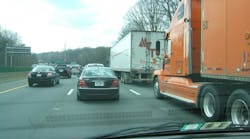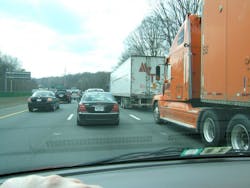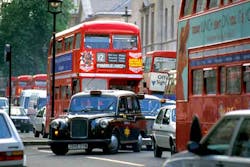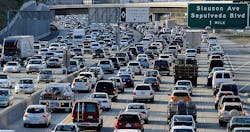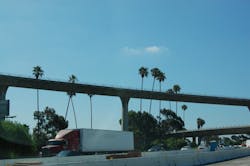Over the next 15 years or so, the total cumulative cost of traffic congestion for these economies is estimated to be $4.4 trillion, the two firms predict.
"This report shows that advanced economies could be heading for 'carmaggedon'," noted Kevin Foreman, general manager of geo-analytics for INRIX, in the report. "The scale of the problem is enormous, and we now know that gridlock will continue to have serious consequences for national and city economies, businesses and households into the future.”
He added that while improving public transport infrastructure may provide more choice for travelers, it won't solve the traffic congestion problem.
Instead, technology innovations like multi-modal routing and real-time traffic in connected cars and on mobile devices should be adopted more widely, helping to create smarter cities worldwide, Foreman said.
Of the four countries studied, the U.K. will see the largest overall increase in the annual cost of congestion, rising from $20.5 billion in 2013 to $33.4 billion in 2030 – a 63% increase – followed by the U.S. (up 50%), France (up 31%) and Germany (up 31% as well).
Foreman stressed that in this study, the cost of congestion is calculated from direct costs – such as the value of fuel wasted and the time spent in gridlock – rather than being productive at work, and indirect costs, where higher freighting and business fees from company vehicles idling in traffic can pass on additional costs to household bills.Cebr took a deeper dive into the real-traffic data pool to examine the annual cost of congestion for the most gridlocked cities in each of the countries studied. These cities are: London, Los Angeles, Paris and Stuttgart.
The combined city economy-wide costs will rise from $46.6 billion in 2013 to $75.9 billion in 2030 – a 63% increase in the cost imposed on these cities as a result of traffic congestion, according to INRIX and Cebr’s analysis, with Londoners facing the biggest impact as the cost of gridlock to them is expected to rise by more than 70% between 2013 and 2030 – costing the London economy $14.5 billion in 2030 and more than $200 billion over the entire period.
In terms of the cost of congestion per individual households country-wide, Cebr found that road usage – measured as the total passenger vehicle miles travelled per annum – is expected to increase on average by 19% across the four countries studied, resulting in a 6% decrease in the average congested speed during peak periods, thereby increasing the time wasted in traffic congestion and increasing the overall individual cost of gridlock to households.Again, British drivers face the largest increase in annual hours wasted over the forecast period, and as a result U.K households face the highest annual cost of congestion in 2030 at $3,217.
Although the U.S. will see a 33% increase from today, households will still enjoy the lowest cost in 2030 at $2,301, Cebr’s research indicates, as the U.S. maintains the lowest amount of annual hours wasted in traffic congestion, resulting in U.S. drivers wasting less fuel and time.
In terms of the cost of congestion for individual households at the city level, Cebr found that there will be an average increase of 21% in total passenger vehicle miles travelled between 2013 and 2030 across the cities studied.
As a result, the average congested speed during peak periods is expected to decline by 11%, the firm noted, thereby increasing the number of hours wasted annually by commuters and driving up the cost to individual households as a result of idling in traffic.
On a city-by-city basis, those findings suggest that Parisian car commuting households will experience the largest annual cost increase at 51% between 2013 and 2030, Cebr noted.Yet Los Angeles households are still expected to incur the highest overall annual cost at $8,555 in 2030, as the “City of the Angels” remains home to the largest percentage of people commuting by car at 67%.
Indeed, Cebr’s data notes that Los Angeles also has the highest number of cars than any other city examined at 4.5 million and thus the confluence of those factors contributes to an expected 16% increase in annual hours wasted between 2013 and 2030.
Whew! Certainly not the kind of predictions truckers want to see as they must still wend their way thru such congestion to deliver goods and services on time as much as possible. Yet there seems to be no getting around the gridlock engulfing our roads at least in the short-term.
